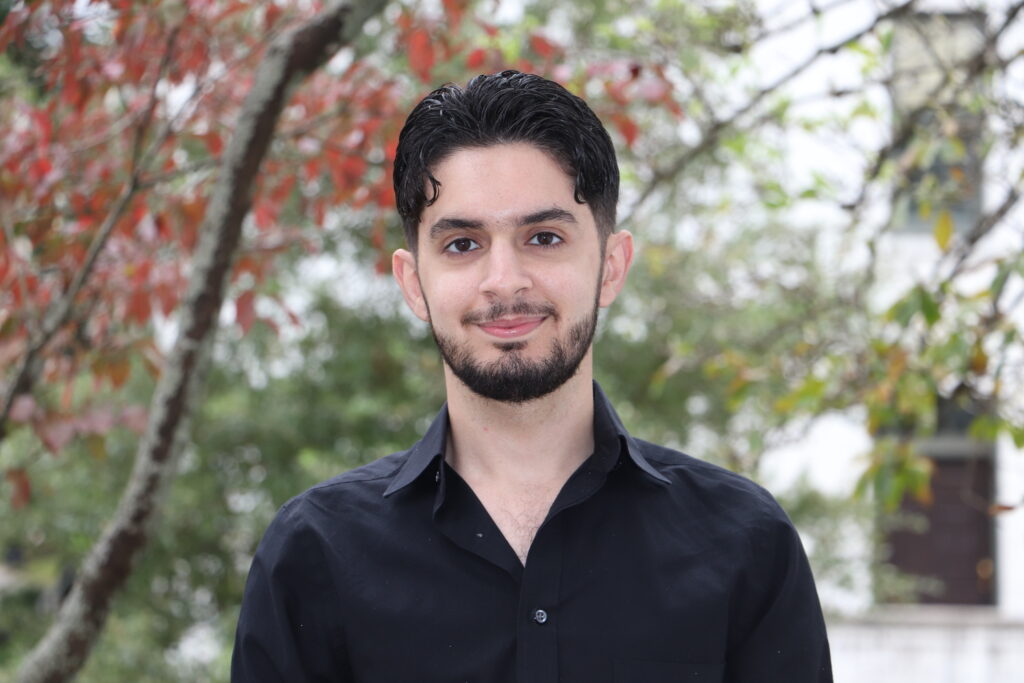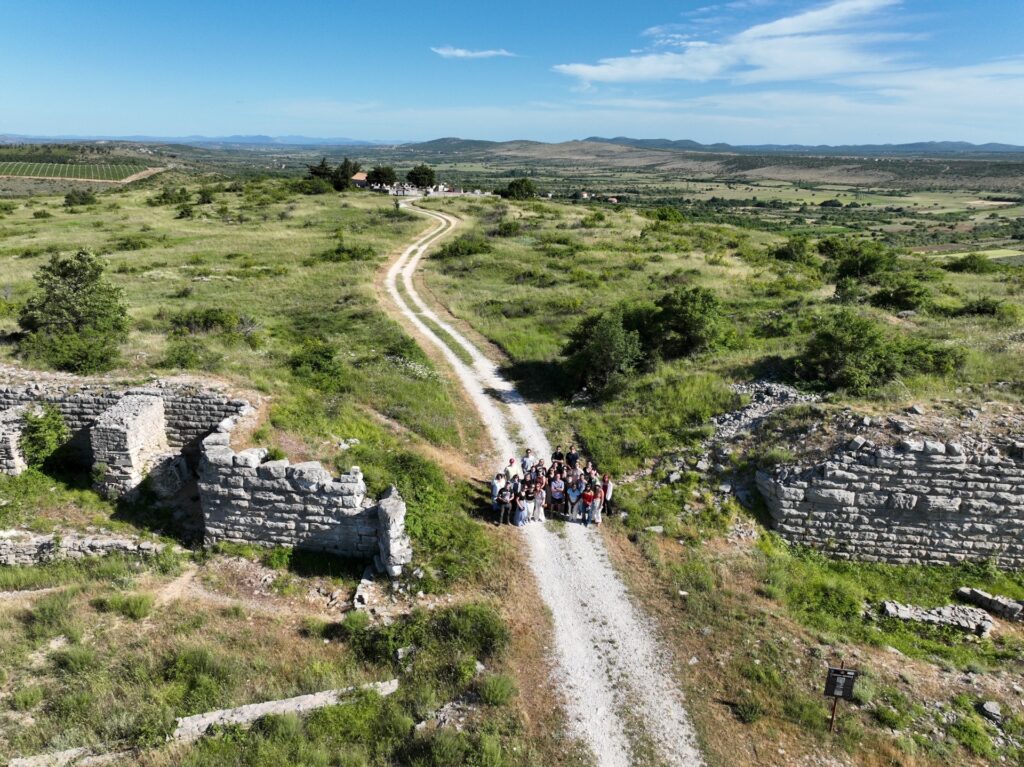Et docere et rerum exquirere causas
Translation: To show and inquire in regards to the nature of issues.”
When college students make their method to the highest of the Miller Studying Heart, they could discover the Latin phrase above—the college’s motto—carved into the partitions. Though Latin is taken into account an “historic language,” extra College of Georgia college students can translate the motto than you may assume.
The Classics and historic languages have been a part of UGA’s curriculum since its constitution practically 240 years in the past. Again then, all college students needed to take Latin and Greek. Although now not a prerequisite, the so-called lifeless languages are nonetheless very a lot alive at UGA.
The division has thrived attributable to its willingness to adapt. From 1948 by way of 1980, James W. Alexander led the Classics by way of a renaissance and introduced the division to the nationwide stage.
Alexander pioneered Classics-in-Translation programs, increasing the division’s curriculum by utilizing translated historic texts to show historic tradition and civilization, evolving from solely providing conventional language programs. It was a trailblazing transfer on the time.
Richard A. LaFleur, Franklin Professor of Classics Emeritus and Alexander’s successor as division head from 1980 by way of 2001, says whereas not everybody desires to study an historic language, many are inquisitive about historic tradition, mythology, and faith.
Alexander satisfied directors to permit these new programs to rely towards required arts and sciences credit, which boosted enrollment.
“It opened up a brand new world to college students seeking to fill diploma necessities,” LaFleur says. “College students might select not simply from authors like Shakespeare, however they may additionally select from Classical Greek and Latin literature.”
The college’s motto: “To show and inquire in regards to the nature of issues,” within the unique Latin, greets guests to the Miller Studying Heart. Classics division head Mario Erasmo is devoted to holding the supposedly lifeless language very a lot alive on campus. (Photograph by Peter Frey/UGA)
The Classics At the moment
At the moment, the Franklin School of Arts and Sciences Division of Classics’ enrollment holds robust, and the Latin program’s numbers are significantly spectacular. The Trendy Language Affiliation’s 2023 experiences declared UGA’s Latin program the nation’s largest—a title it has maintained for greater than 15 years—topping greater than 2,450 different schools and universities.
Typically, when college students take their first course within the division, they get hooked. Many proceed to take Classics programs all through their faculty profession and even add a serious or minor to their diploma path, says Mario Erasmo, a professor of Classics and present head of the division.
Mohammad Al Eethawi, a rising senior from Buford, is a type of college students.
After starting his research at UGA, he discovered that “every thing is constructed upon Classics,” from a lot of Western literature to Disney motion pictures. He fell in love with the subject material and needed to immerse himself additional. He appeared for extra topics, like scientific naming, that might help him in his research as a pre-med scholar, and he added a minor.
“Learning Classics not solely shapes my approach of viewing schooling but in addition the world normally,” he says.
Al Eethawi carried out unbiased undergraduate analysis beneath the course of Erasmo, who inspired him to discover medication in antiquity. So he analyzed the phrases of historic physicians like Galen and the way their concepts tie into fashionable medication.
Certainly one of Al Eethawi’s most important takeaways: The previous influences our future. He gained a way of hope after studying how innovators within the historic world progressed and overcame medical obstacles. That adaptability bodes nicely for our potential to beat our personal challenges in fashionable medication.
“With out the colours of the previous, you don’t have an entire image of the longer term,” Al Eethawi says. “And I’m not simply studying about medication now; I’m studying about medication prior to now, which predicts the longer term in a approach.”

Mohammad Al Eethawi hopes to create a brand new scholar group inside the division for different pre-med college students finding out Classics as a method to join and create a assist system for college students with related pursuits. With the addition of a brand new medical college on campus quickly, Classics professor Mario Erasmo expects even greater numbers of pre-med college students like Al Eethawi and elevated enrollment in programs like medical terminology, which is housed within the division.
Classically Skilled
LaFleur says Latin is “quintessentially interdisciplinary,” that means that college students don’t simply study a language but in addition find out how Latin interprets into their chosen discipline of examine. College students depart this system extra geared up to excel of their professions, which vary from medication and legislation to enterprise and agriculture.
“Nearly each occupation in our tradition at the moment has analogs within the historic world,” he says. “So the extra you examine the roots of your occupation, the extra broadly knowledgeable you’re going to be.”
In a world more and more centered on developments in STEM fields, there’s a have to combine Classical research with fashionable sciences now greater than ever.
Many information scientists examine the Classics and humanities to sharpen analytical considering, writing expertise, and problem-solving by viewing their work by way of a historic, real-world lens. The division is making a curriculum that might bridge the perceived divide between STEM disciplines and humanities, a divide that Erasmo says is synthetic.
In spite of everything, the phrases science, know-how, engineering, and arithmetic derive, just like the disciplines themselves, from Greek and Latin.
This 12 months, the Classics division employed a brand new college member centered on information science pedagogy, and it’s the first program within the nation to take action.
“At UGA, the oldest faculty is Arts and Sciences. Humanities and science go aspect by aspect,” Erasmo says. “STEM and information science ought to insert themselves extra into Classics and vice versa.”
The Classics Division’s motto is “getting ready you for what comes subsequent,” which is Erasmo’s inspiration as nicely. When he thinks in regards to the future, he sees the division persevering with to rework, discovering new methods to encourage interdisciplinary examine and put together college students for his or her futures.
“I might love for us to maintain reinventing,” Erasmo says. “As an alternative of claiming, ‘I want we might do this,’ simply saying, ‘Let’s take part.’”

UGA’s Classics program presents college students from all disciplines examine overseas alternatives that embody visits to gorgeous websites like the traditional hilltop fortress ruins of Asseria in Croatia.
Taking the Highway to Antiquity
The Colosseum in Rome, the ruins of historic Greece, historic forts like Vindolanda in England—remnants of the traditional world exist within the fashionable age, ready to be explored. The Classics Division takes its college students past the classroom, giving them up shut and private experiences with historic areas.
The division homes considered one of UGA’s founding faculty-led examine overseas applications, UGA in Rome, which started in 1970. Since then, the division has added two extra applications—UGA Classics Europe: Unearthing the Previous and UGA-Franklin Croatia: Heritage Conservation and Archaeology—and presents affiliate applications with UGA at Oxford and Cortona, Italy.
Erasmo leads Unearthing the Previous, a faculty-led Maymester program traversing Europe from Greece to Scotland, stopping at historic websites alongside the best way.
“I feel it’s good for our college students to see different cultures of their contexts,” Erasmo says. “It’s important for college students to get on the market and for us to steer them in our personal teams. We train at areas and at museums, on avenue corners, in church buildings, archaeological websites, wherever we will.”
These applications are open to UGA college students of all disciplines. The examine overseas applications have develop into one thing of a recruiting instrument for the division, with many college students including second majors or minors impressed by their journeys.
“We put numerous work into it,” Erasmo says. “However what we get out of it’s seeing college students fully engaged, fully immersed in classical antiquity and its reception, and it helps us broaden our main and minor bases.”






























































